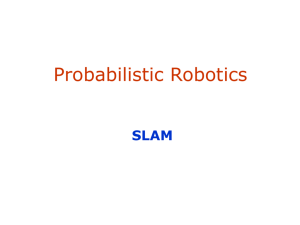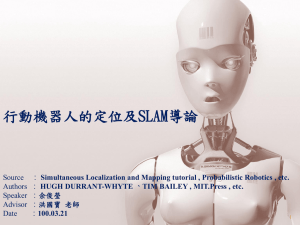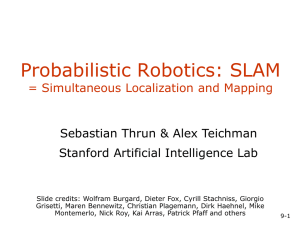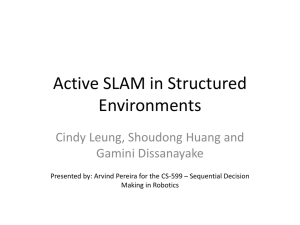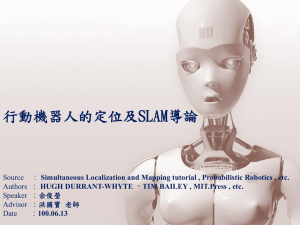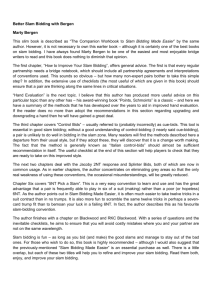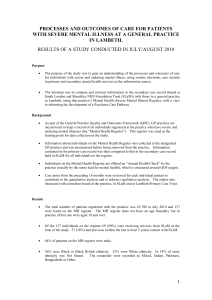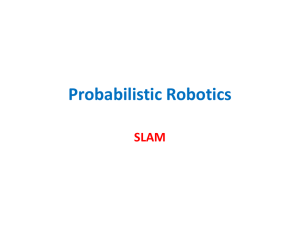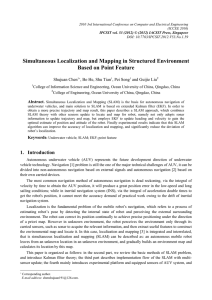SLAM - Probabilistic Robotics
advertisement
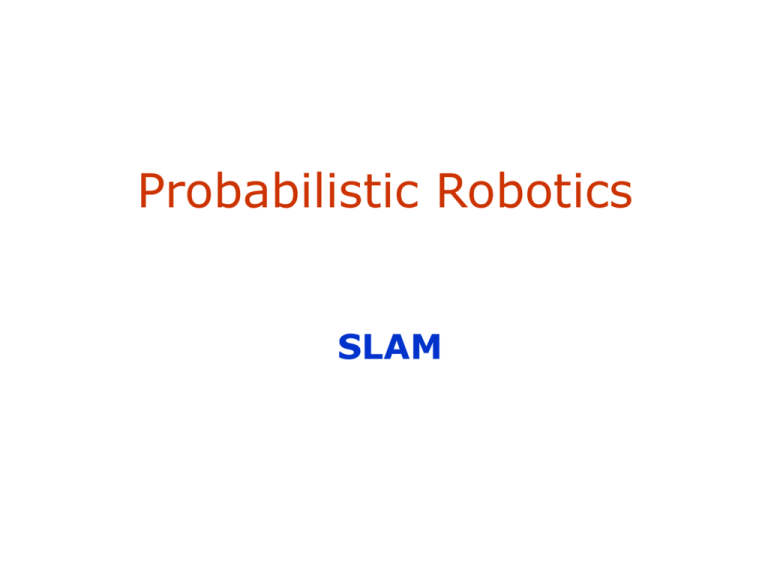
Probabilistic Robotics SLAM The SLAM Problem A robot is exploring an unknown, static environment. Given: • The robot’s controls • Observations of nearby features Estimate: • Map of features • Path of the robot 2 Structure of the Landmarkbased SLAM-Problem 3 Mapping with Raw Odometry 4 SLAM Applications Indoors Undersea Space Underground 5 Representations • Grid maps or scans [Lu & Milios, 97; Gutmann, 98: Thrun 98; Burgard, 99; Konolige & Gutmann, 00; Thrun, 00; Arras, 99; Haehnel, 01;…] • Landmark-based [Leonard et al., 98; Castelanos et al., 99: Dissanayake et al., 2001; Montemerlo et al., 2002;… 6 Why is SLAM a hard problem? SLAM: robot path and map are both unknown Robot path error correlates errors in the map 7 Why is SLAM a hard problem? Robot pose uncertainty • In the real world, the mapping between • • observations and landmarks is unknown Picking wrong data associations can have catastrophic consequences Pose error correlates data associations 8 SLAM: Simultaneous Localization and Mapping • Full SLAM: Estimates entire path and map! p( x1:t , m | z1:t , u1:t ) • Online SLAM: p( xt , m | z1:t , u1:t ) p( x1:t , m | z1:t , u1:t ) dx1dx2 ...dxt 1 Integrations typically done one at a time Estimates most recent pose and map! 9 Graphical Model of Online SLAM: p( xt , m | z1:t , u1:t ) p( x1:t , m | z1:t , u1:t ) dx1 dx2 ...dxt 1 10 Graphical Model of Full SLAM: p( x1:t , m | z1:t , u1:t ) 11 Techniques for Generating Consistent Maps • Scan matching • EKF SLAM • Fast-SLAM • Probabilistic mapping with a single map and a posterior about poses Mapping + Localization • Graph-SLAM, SEIFs 12 Scan Matching Maximize the likelihood of the i-th pose and map relative to the (i-1)-th pose and map. [ t 1] xˆt arg max p( zt | xt , mˆ ) p( xt | ut 1 , xˆt 1 ) xt robot motion current measurement map constructed so far ˆ according to “mapping Calculate the map m with known poses” based on the poses and observations. [t ] 13 Scan Matching Example 14 Kalman Filter Algorithm 1. Algorithm Kalman_filter( mt-1, St-1, ut, zt): 2. 3. 4. Prediction: m t At mt 1 Bt ut 5. 6. 7. 8. Correction: 9. Return mt, St St At St 1 AtT Rt Kt St CtT (Ct St CtT Qt )1 mt m t Kt ( zt Ct m t ) St ( I Kt Ct )St 15 (E)KF-SLAM • Map with N landmarks:(3+2N)-dimensional Gaussian Bel ( xt , mt ) x y l1 , l 2 lN x2 xy x xl1 xl2 xl N xy y2 y yl1 yl2 yl N x y 2 l1 l2 lN xl1 yl1 l1 l21 l1l2 l1lN xl2 yl2 l2 l1l2 l22 l2l N xl N ylN lN l1lN l2l N 2 lN • Can handle hundreds of dimensions 16 Classical Solution – The EKF Blue path = true path Red path = estimated path Black path = odometry • Approximate the SLAM posterior with a high• dimensional Gaussian [Smith & Cheesman, 1986] … Single hypothesis data association 17 EKF-SLAM Map Correlation matrix 18 EKF-SLAM Map Correlation matrix 19 EKF-SLAM Map Correlation matrix 20 Properties of KF-SLAM (Linear Case) [Dissanayake et al., 2001] Theorem: The determinant of any sub-matrix of the map covariance matrix decreases monotonically as successive observations are made. Theorem: In the limit the landmark estimates become fully correlated 21 Victoria Park Data Set [courtesy by E. Nebot] 22 Victoria Park Data Set Vehicle [courtesy by E. Nebot] 23 Data Acquisition [courtesy by E. Nebot] 24 SLAM [courtesy by E. Nebot] 25 Map and Trajectory Landmarks Covariance [courtesy by E. Nebot] 26 Landmark Covariance [courtesy by E. Nebot] 27 Estimated Trajectory [courtesy by E. Nebot] 28 EKF SLAM Application [courtesy by John Leonard] 29 EKF SLAM Application odometry estimated trajectory [courtesy by John Leonard] 30 Approximations for SLAM • Local submaps [Leonard et al.99, Bosse et al. 02, Newman et al. 03] • Sparse links (correlations) [Lu & Milios 97, Guivant & Nebot 01] • Sparse extended information filters [Frese et al. 01, Thrun et al. 02] • Thin junction tree filters [Paskin 03] • Rao-Blackwellisation (FastSLAM) [Murphy 99, Montemerlo et al. 02, Eliazar et al. 03, Haehnel et al. 03] 31 Sub-maps for EKF SLAM [Leonard et al, 1998] 32 EKF-SLAM Summary • Quadratic in the number of landmarks: O(n2) • Convergence results for the linear case. • Can diverge if nonlinearities are large! • Have been applied successfully in large-scale environments. • Approximations reduce the computational complexity. 33
